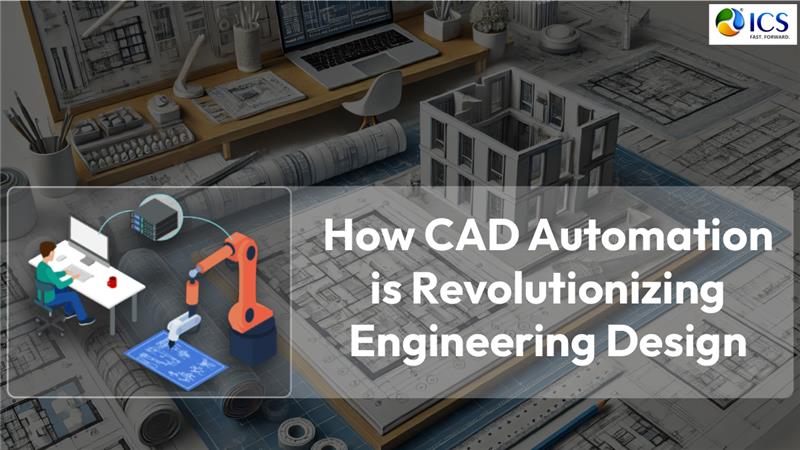There is hardly any organization in the rapidly developing engineering world that does not emphasize innovation and speed. The engineering and design industry is on the receiving end as clients demand shorter development cycles, improved accuracy, and lower costs. Sequential design processes are nevertheless conventional and, although practical, are often slow and vulnerable to human interference. This is where CAD automation steps in to redesign the way that engineering design is conducted completely.
CAD automation leverages advanced algorithms, parametric modeling, and generative design to automate repetitive tasks, reduce design cycle times, and improve product quality. From concept creation to final production, automation streamlines complex workflows, enabling engineers to focus on innovation rather than mundane tasks. Let’s explore how CAD automation is transforming the engineering landscape.
Key Benefits of CAD Automation
1. Faster Design Cycles
One of the most significant advantages of CAD automation is its ability to accelerate design processes. Engineers can automate repetitive tasks, such as creating standard components, updating drawings, or generating design variations. This not only speeds up the design cycle but also enhances overall productivity.
For example, a mechanical engineer working on gear systems can use automation to quickly generate multiple gear configurations by changing a few parameters. What once took hours can now be accomplished in minutes, reducing time-to-market for new products.
2. Enhanced Accuracy and Consistency
Manual design processes are susceptible to human error, which can lead to costly mistakes during manufacturing. CAD automation ensures that designs adhere to predefined standards and specifications, significantly improving accuracy and consistency across projects. Automated checks and validations help detect errors early, ensuring a higher level of precision in the final output.
3. Increased Customization and Scalability
CAD automation allows for the easy creation of design variants tailored to specific requirements. Parametric modeling enables engineers to modify dimensions, materials, and features without starting from scratch. This flexibility is particularly valuable in industries requiring customized products, such as automotive, aerospace, and consumer goods.
Additionally, automation makes scaling production much easier. Once a design template is established, it can be reused and adapted for different projects with minimal effort, saving both time and resources.
4. Integration with Advanced Technologies
CAD automation seamlessly integrates with other advanced technologies, such as 3D printing, simulation, and digital twins. Engineers can quickly move from design to prototyping and testing, shortening the product development lifecycle. Automated tools can also generate complex geometries that are difficult or impossible to create manually, opening new avenues for innovation.
Real-world Applications of CAD Automation
1. Generative Design
Generative design uses CAD automation to create optimized designs based on specific constraints and performance requirements. By inputting parameters such as weight, material, and load conditions, the software can generate thousands of potential designs, selecting the best options for further development.
2. Automated Drawing Creation
Creating detailed 2D drawings from 3D models is a time-consuming task. CAD automation can generate these drawings automatically, ensuring that they remain consistent with the original 3D model. This reduces manual work and ensures faster delivery of design documentation.
3. Design for Manufacturing (DFM)
CAD automation tools can analyze designs for manufacturability, ensuring that they meet production constraints. Automated DFM checks help identify potential issues early, preventing costly revisions during the manufacturing stage.
ICS Expertise in CAD Services
At ICS, we understand the transformative power of CAD automation in engineering design. Our integrated engineering design services are designed to help businesses harness the full potential of CAD technologies. By combining advanced tools with industry expertise, we deliver solutions that drive efficiency, innovation, and cost savings.
ICS CAD Services Include:
1. CAD Design and Drafting Services
Our CAD team offers comprehensive design and drafting solutions tailored to meet diverse industry needs. Whether it’s creating detailed 2D drawings or complex 3D models, we ensure precision and quality at every step.
2. Mechanical CAD Services
We specialize in mechanical CAD services, helping clients design intricate mechanical components and assemblies. Our expertise spans various industries, including automotive, aerospace, and industrial equipment.
3. Electrical CAD Services
ICS provides advanced electrical CAD services, enabling clients to design and document electrical systems with ease. Our automated processes ensure accuracy in wiring diagrams, panel layouts, and schematics.
4. CAD Conversion Services
We assist businesses in converting legacy designs into modern CAD formats, ensuring compatibility with the latest software. This service helps clients maintain and update their designs without starting from scratch.
5. 3D Modeling and Rendering
Our team excels in creating high-quality 3D models and photorealistic renderings, enabling clients to visualize their designs before production. This not only aids in decision-making but also enhances communication with stakeholders.
CAD automation is steering the engineering industry by changing how designs can be done fast, accurately, and flexibly. When companies opt to advance, automation becomes vital for sustaining a competitive edge. ICS takes a stand in this revolution, and we offer the full range of CAD services to satisfy all our customers’ demands. Whether you require the current design solution or integrated CAD service, ICS is your reliable source for engineering productivity improvement. Are you ready for a radical redesign of the design process? Get in touch with ICS today!

